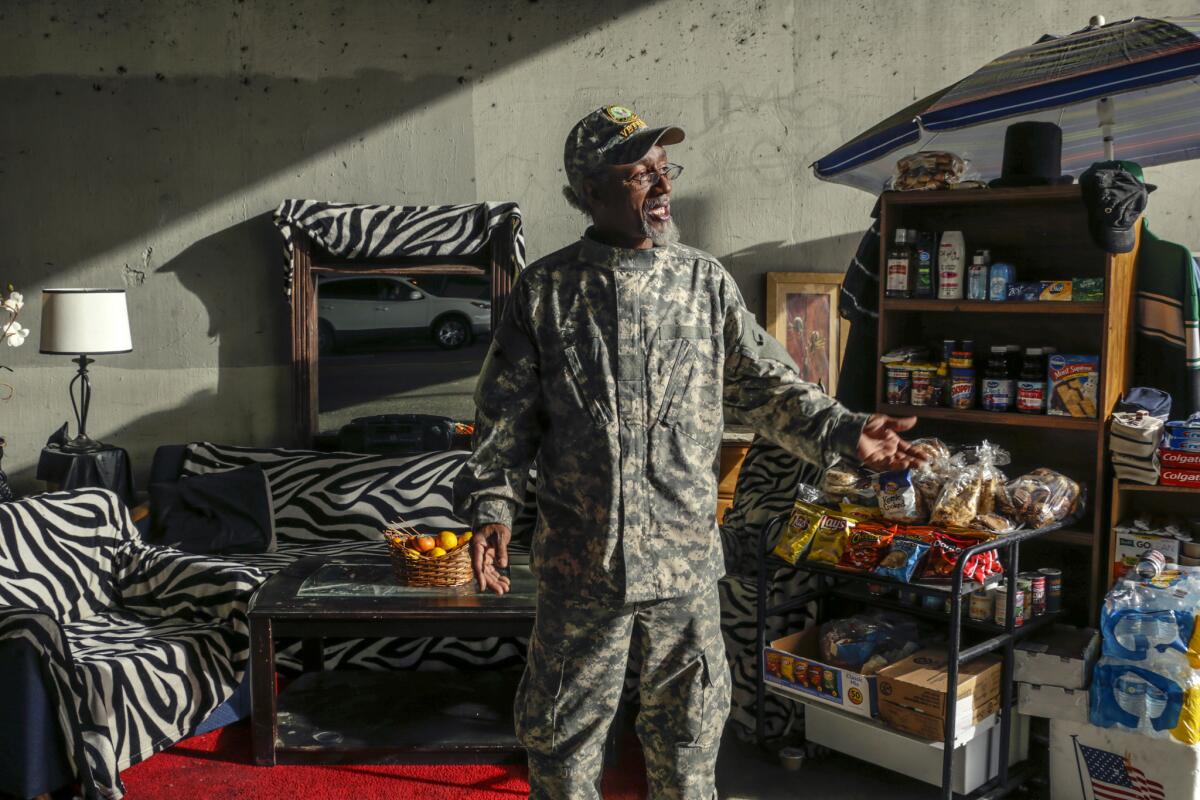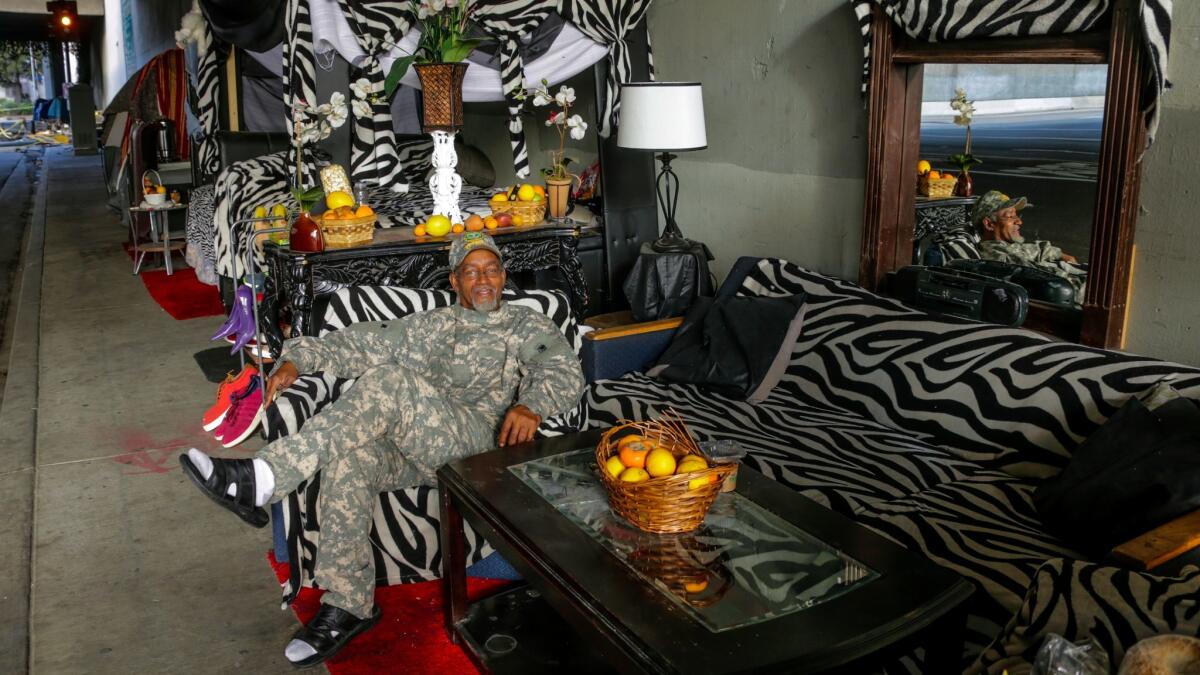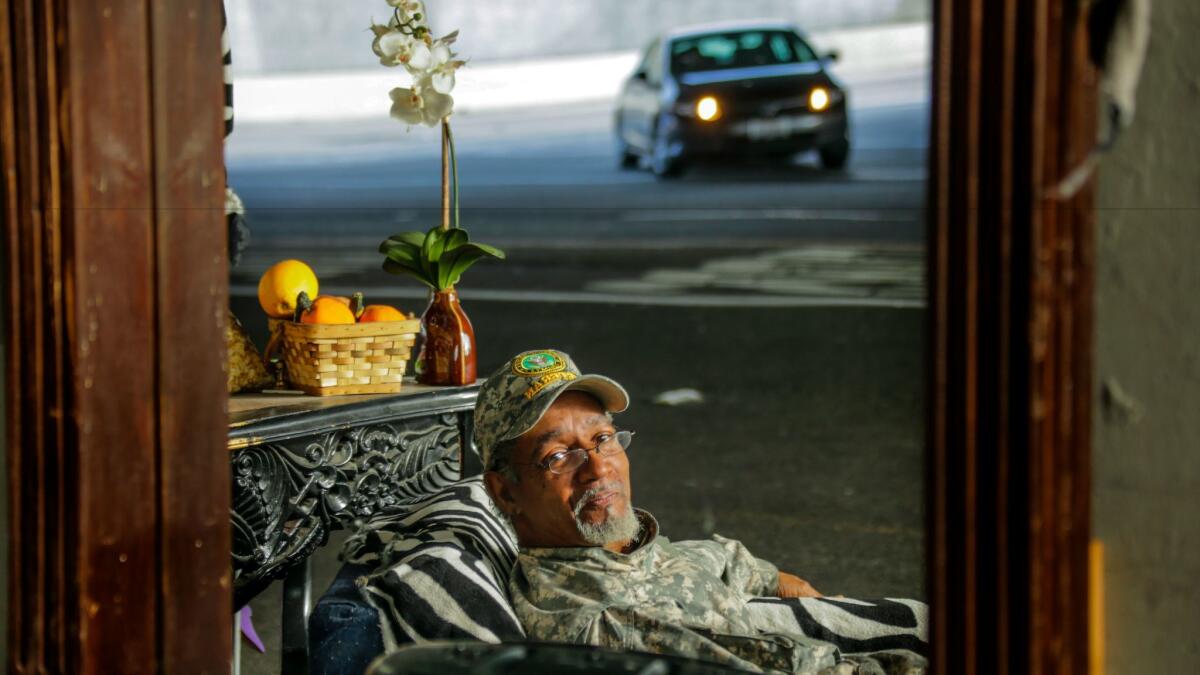Standoff beneath the 110 Freeway: Homeless man builds a compound, officials tear it down, he rebuilds

Ceola Waddell Jr. has what may be the most eye-popping digs of any homeless man in Los Angeles.
A video tour of his living room sofa and love seat, porcelain toilet and zebra-skin slipcovers has been viewed 1.4 million times on Facebook. His fans make pilgrimages to the tent-lined strip beneath the 110 Freeway near the Coliseum — he calls it “Paradise Lane” — to chortle and take selfies.
His quarters are so spacious that another homeless man is paying him $25 a week to rent a tent, sandwiched between the “guest room” and a third mattress and headboard. Waddell, who also goes by Mr. Dice, calls it his “Airbnb.”
“I was walking by and I saw the little sign, ‘For rent,’ ” said the tenant, Anthony Garcia, 39.
But what delights Waddell’s followers does not sit well with the city, whose sanitation crews have twice dismantled and carted off his handiwork. Last week, workers removed a refrigerator with an “abundance of rotting food,” “explosive materials” and other unhealthy items, said Bureau of Sanitation spokeswoman Elena Stern.

Two days later, Waddell had scavenged neighborhood castoffs and rebuilt most of the setup, with flourishes that include ceramic planters with paper orchids, a surfboard and a hot dog stand.
“I refuse to let the city beat me down to what they think a homeless person’s profile is, living on cardboard,” said Waddell, 59. “This should be a landmark.”
Waddell’s standoff with the city comes a year after elected leaders called for a state of emergency to be declared over homelessness, with the encampments that stirred political passions still standing in many neighborhoods.
Homelessness plans released in February by the city and county spurred voter approval this month of a $1.2-billion bond issue to fund new homeless housing. But the construction will take 10 years, and housing homeless people in the meantime is moving slowly.
Sanitation crews receive 100 to 200 reports of encampments a week, and the numbers keep growing.
“Our main priority always is to get unsheltered homeless individuals off the streets and into housing,” said Los Angeles Homeless Services Authority spokesman Tom Waldman.
Mayor Eric Garcetti’s spokeswoman, Connie Llanos, said, “We know that none of these strategies will solve our homelessness crisis overnight, but Mayor Garcetti is committed to ensuring that the crisis is solved as quickly as possible.”

Stern said Waddell refused homeless services, including temporary housing. Waddell declined to speak to City Councilman Curren D. Price Jr. when he visited homeless camps under freeway bridges in his South Los Angeles district, Price’s spokeswoman said.
“There’s been a great deal of public safety and public health concern from neighbors in the area, as well as LAPD and the Sanitation Department,” said the spokeswoman, Angelina D. Valencia.
Waddell insists he wants housing, noting that a car recently careened off the freeway, pinning a homeless woman in her bedding, and two men with a pistol tried to rob him in his bed. “This is not going to be the end of my life,” he said.
Waddell said he first became homeless at age 14 in Memphis, Tenn., where police nicknamed him “Dice” because he didn’t run when they busted craps games. He’s the seventh of eight children of an alcoholic mother. His sisters tried to turn him into a Cinderella to clean up their messes, he said.
He sang soul covers in a bar band before arriving in Los Angeles in 1983, where he did a brief turn as a clothing salesman before deciding he could not work for others. He moved between the streets and pay-by-the-week hotels, depending on the success of various hustles and sales jobs, including, briefly, drugs sales. For 10 years, he lived inside with a girlfriend, but when she died, he lost half his income, landed back on skid row and six months ago arrived at the underpass, he said.
His Internet fame has been rejuvenating, Waddell said, as well as his newfound talent for interior decoration: “I enjoy the hype, like anybody else.”
On Saturday, he pulled up on his beach cruiser towing a shopping cart that bore a bathtub he rescued from a junk heap. ”This is my Jacuzzi,” he said.
A Mercedes, BMWs and a Lexus pulled up in front of his camp for pre-Thanksgiving handouts of tamales and home-cooked turkey dinners. These grass-roots feeding operations, often run by churches, have been another sore spot for city and homeless service officials, who say they generate trash and make it easy for people to remain homeless. Some neighbors say people are hiding in the tents to deal drugs or run prostitution rings.
Rose Sanders, who came to distribute free shoes, said she was homeless until 2014, and the people are truly needy. “People here are really homeless,” Sanders said. “It’s not an easy transition.”
The next day, as Rams fans streamed into the Coliseum, the Dice Dog stand opened for business.
“Dice dogs, dice dogs, what you gonna do when the dog bites you?” Waddell, wearing a white fedora, chef’s jacket and cellophane gloves, sang out as he sliced peppers and onions onto hot links sizzling on a propane stove.
Jose Padilla, 28, of Colton, and Juan Villa, 23, of Riverside lounged on the sofas with oversize beers, praising Waddell’s pricing: $2.50 a dog.
“Fool, at the movie theater one little wiener link costs $6,” Villa told his friend.
Neighbors from nearby homes came by for a smoke or to arrange to barbecue later with Waddell. A few parents pulled their children close, but other passersby yelled encouragement. “It’s a whole house!” one child said.
“I still don’t get it, what’s so fascinating about this place,” Waddell said. “I decided I wanted to live like everybody else, make me something nice that I wanted to come home to.
“If I was in the Arctic I’d make me an igloo.”
To read the article in Spanish, click here
Twitter: @geholland
ALSO
L.A. tops the nation in chronically homeless people, federal report finds
There are 63,000 homeless youths in L.A. County. These are the children of skid row
Enforcement questions add frustration to fear for neighbors of crime-plagued Talbert Regional Park
More to Read
Sign up for Essential California
The most important California stories and recommendations in your inbox every morning.
You may occasionally receive promotional content from the Los Angeles Times.










